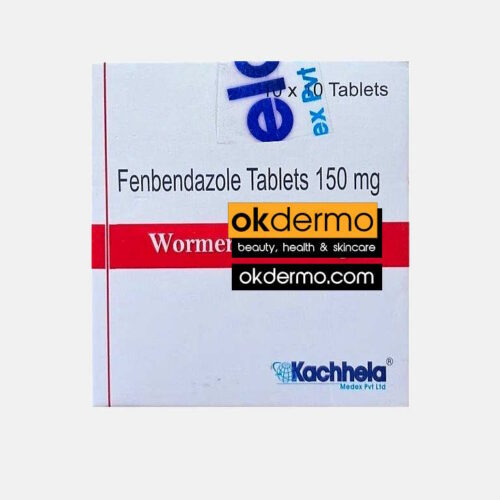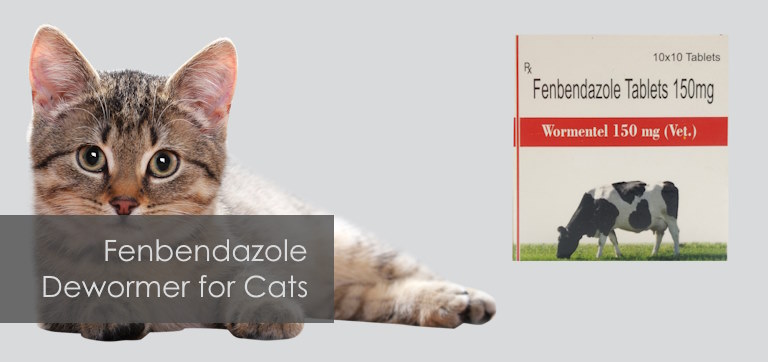Understanding Fenbendazole Dewormer for Cats
Table of Contents
Fenbendazole is a broad-spectrum dewormer widely used within veterinary practice. It serves to treat several parasite infestations including nematodes (worms) and protozoa in pets including cats. Renowned brands of fenbendazole dewormer for cats include Panacur and Safe-Guard.
In this guide, we will address common questions relating to fenbendazole dewormer for cats including its mechanism of action, its spectrum of effectiveness against various feline parasites, and common inquiries pertaining to its usage.
What is Fenbendazole?
Fenbendazole belongs to a class of drugs known as benzimidazole antiparasitic agents and is known for its extensive efficacy against various internal parasites in pets.
-

Wormentel® Fenbendazole Tablets
Fenbendazole 150mg / 222mg / 444mg
Size: 30 Tablets
Brand name: Panacur, Safe-Guard, Fenben
From USD $45.00 Select options
Mechanism Of Action
When ingested, Fenbendazole dewormer for cats operates by disrupting the parasites’ ability to maintain their cellular structure and metabolism which leads to their death. Microtubules are structures within cells that aid the transportation of materials required for metabolism and energy production. Fenbendazole intervenes in this transportation system within affected parasites. Specifically, it inhibits tubulin polymerization, thereby interfering with microtubule formation, a crucial process for the parasite’s survival.
Moreover, at elevated doses, it may interfere with the metabolic enzymes and chemical pathways within the cells of these parasites.
Fenbendazole for Cats: Uses and Benefits
Fenbendazole dewormer for cats has demonstrated notable effectiveness in treating a wide array of common intestinal parasites. Some of the most prevalent parasites targeted by fenbendazole include roundworms, hookworms, whipworms, and certain protozoa.
Studies and clinical experience have shown that fenbendazole for cats effectively eliminates these parasites from the gastrointestinal tract, thereby helping to restore their health and overall well-being.
- Roundworms (Nematodes): Roundworms, such as Toxocara cati and Toxascaris leonina, are among the most common intestinal parasites found in cats, especially in kittens. Fenbendazole dewormer for cats has been shown to effectively eradicate these roundworms, thereby preventing potential complications associated with their presence, such as intestinal obstruction and poor growth.
- Hookworms: Fenbendazole is also effective against hookworm infections in cats, including Ancylostoma tubaeforme and Ancylostoma braziliense. Hookworm infestations can lead to symptoms such as anaemia and gastrointestinal distress in affected cats. By interfering with their microtubule formation, fenbendazole impairs the hookworms’ ability to feed and reproduce, leading to their eventual elimination from the cat’s gastrointestinal tract.
- Whipworms: Although less common in cats, fenbendazole dewormer for cats can also target whipworm infections, such as Trichuris serrata.
- Protozoal Parasites: Fenbendazole exhibits efficacy against certain protozoal parasites, including Giardia spp., although its effectiveness may vary depending on the specific species and strain. While not as potent against protozoa as it is against nematodes, fenbendazole cats may still be considered as part of a comprehensive treatment regimen for protozoal infections in cats.
Benefits of using fenbendazole dewormer for cats compared to other options:
One of the key benefits of using fenbendazole dewormer for cats is its broad-spectrum activity against a variety of intestinal parasites. This means that a single medication can effectively target multiple types of parasites, simplifying treatment and reducing the need for multiple medications.
Furthermore, fenbendazole is generally well-tolerated by cats, with few reported side effects when used as directed. This makes it a suitable option for deworming cats of all ages, including kittens and pregnant or lactating cats, under veterinary supervision.
Additionally, fenbendazole is available in various formulations, including oral suspensions and granules, making it easy to administer to cats, even those who may be finicky about taking medications.
Fenbendazole For Humans – What Does Research Reveal
Although primarily used to treat parasitic infections in animals and humans, Fenbendazole has garnered attention in recent years for its growing potential in human health.
- Cancer Treatment: Cancer treatment in particular is a promising avenue for human use of fenbendazole. While research on fenbendazole’s efficacy in humans is still in its early stages, some studies and anecdotal evidence suggest promising outcomes. One notable study published in 2018 explored fenbendazole’s anticancer properties, indicating its ability to inhibit tumor growth in mice by targeting microtubule dynamics. This mechanism of action disrupts cancer cell division, potentially slowing tumor progression. Additionally, fenbendazole has shown synergistic effects with other cancer treatments, enhancing their effectiveness.
- Antiviral properties: Fenbendazole’s potential antiviral properties have been demonstrated in preclinical research. In a broad screening of FDA-approved drugs against SARS-CoV-2, the virus responsible for COVID-19, fenbendazole was identified as a compound with potential antiviral activity.
Despite these promising findings, it’s crucial to approach the use of fenbendazole in humans with caution. Clinical trials are needed to further evaluate its safety and efficacy, as well as determine optimal dosages and treatment regimens.
How to Use Fenbendazole Cats Safely
Ensuring the safe and effective use of fenbendazole in cats involves adhering to proper dosage guidelines, utilizing appropriate administration methods, and following veterinary recommendations to prevent potential risks associated with over-dosage.
Dosage Guidelines for Cats and Kittens:
Determining the correct dosage of fenbendazole for cats and kittens is crucial to achieving optimal treatment outcomes while minimizing the risk of adverse effects. Dosage recommendations may vary depending on factors such as the cat’s weight, age, and the specific parasite being targeted.
- For adult cats: The typical dosage of fenbendazole for adult cats is 50 mg/kg once daily for three consecutive days. However, it is essential to consult with a veterinarian to obtain accurate dosage recommendations tailored to the individual cat’s needs.
- For kittens: Dosage adjustments may be necessary for kittens, as their smaller size and developing immune systems may require lower doses. Veterinary guidance is essential to ensure safe and effective treatment for kittens.
Administration Methods: Oral Administration and Dosage Calculation Based on Weight:
Fenbendazole for cats is commonly administered orally, either as a liquid suspension or in granule form. Oral administration allows for easy and accurate dosing, ensuring that the medication reaches the gastrointestinal tract where parasites reside.
To administer fenbendazole safely to your cat, follow these steps:
- Calculate the Dosage: Use an accurate scale to weigh your cat. Refer to the dosage guidelines provided by your veterinarian or on the product label to determine the appropriate dosage based on your cat’s weight.
- Prepare the Medication: If using fenbendazole in liquid suspension form, shake the bottle well before use. If using granules, follow the instructions for reconstitution.
- Administer the Medication: Depending on your cat’s preference and the formulation of fenbendazole you have, you can mix the medication with a small amount of food or administer it directly into your cat’s mouth using a syringe or dropper. Be gentle and patient to ensure your cat swallows the medication properly.
- Monitor Your Cat: Keep an eye on your cat after administering fenbendazole for any signs of adverse reactions or side effects, such as vomiting, diarrhea, or lethargy. If you notice any concerning symptoms, contact your veterinarian immediately.
- Complete the Treatment Course: Follow the prescribed treatment course as directed by your veterinarian, even if your cat appears to be improving. Skipping doses or ending treatment prematurely can lead to incomplete parasite elimination and potential recurrence of infestation.
- Follow-Up with Your Veterinarian: After completing the treatment course, schedule a follow-up appointment with your veterinarian to assess your cat’s response to the medication and determine if additional treatment or monitoring is necessary.
Fenbendazole Off-Label Use
Pancreatic cancer is one of the most aggressive forms of cancer, with low survival rates. This disease is known for its late-stage diagnosis and limited treatment options. As a result, researchers are constantly looking for new approaches to manage it.
While several early studies have provided initial evidence suggesting fenbendazole (Panacur, Safe-Guard) has the potential to treat various types of cancer, including pancreatic cancer, further research is needed to determine its success and safety in human clinical trials.
Fenbendazole as a Potential Anticancer Drug: Fenbendazole is a broad-spectrum anthelmintic medication primarily used in veterinary medicine to treat animal gastrointestinal parasites. It belongs to the benzimidazole class of medications and is effective against various parasites, including roundworms, hookworms, whipworms, and certain animal tapeworms.
While fenbendazole was initially formulated for veterinary use, preliminary suggests that fenbendazole may inhibit cancer cell growth and induce cancer cell death through various mechanisms, such as disruption of microtubule formation and inhibition of glucose uptake.
However the use of fenbendazole for pancreatic cancer is still experimental, and more studies are needed to determine its success and safety in humans. Although there’s limited research specifically focused on fenbendazole for pancreatic cancer, several studies have explored its anticancer properties in general. But the research is still in its early stages, and more research, including clinical trials, is needed to determine its success and safety in people with pancreatic cancer.
Addressing Dosage Based on Specific Brands
Safeguard is a popular and widely used brand of fenbendazole for cats. When it comes to administering Safeguard fenbendazole to cats and kittens, it’s crucial to ensure accurate dosing for effective treatment while minimizing the risk of adverse effects. Here’s what you need to know:
Safeguard Fenbendazole Dosage for Cats:
The recommended Safeguard fenbendazole dosage for cats typically follows a regimen of 50 mg/kg of body weight, administered orally for three consecutive days. However, it’s important to consult with your veterinarian to determine the precise Safeguard Fenbendazole dosage for cats based on your cat’s weight, age, and health status. Veterinarians may recommend adjustments to the dosage regimen depending on the severity of the parasitic infestation, any kidney or liver disease your cat may have, and the individual cat’s response to treatment.
Safeguard fenbendazole is available in various formulations, such as liquid suspensions or granules, each with specific dosing guidelines. Be sure to measure the medication accurately and administer it as directed to ensure optimal treatment outcomes.
How Much Safeguard to Give a Cat:
To determine the appropriate Safeguard fenbendazole cats dosage and how much Safeguard to give a cat, you’ll need to calculate it based on your cat’s weight. Using an accurate scale, weigh your cat and consult with your veterinarian to obtain the recommended dosage in milligrams (mg) or millilitres (ml). Administer the calculated dosage orally, following the instructions provided by your veterinarian or on the product label.
For example, if your cat weighs 5 kilograms and the recommended dosage is 50 mg/kg, the total dosage for a three-day treatment regimen would be 250 mg per day (50 mg/kg x 5 kg). Divide this total dosage into smaller, equal doses to be administered once daily for three consecutive days.
Safeguard Dosage for Kittens:
Safeguard dosage for kittens may vary as kittens may require dosage adjustments due to their smaller size and developing immune systems. Your veterinarian can provide guidance on the appropriate Safeguard dosage for kittens based on their weight, age, and health status. Generally, kittens may require lower doses of fenbendazole compared to adult cats to avoid potential toxicity.
When administering Safeguard fenbendazole to kittens, it’s essential to use a precise measuring device to ensure accurate dosing. Liquid formulations may be easier to administer to kittens, as the dosage can be adjusted more precisely based on their weight.
Potential Side Effects of Fenbendazole
Fenbendazole is generally safe and well-tolerated by cats, but like any medication, it can cause side effects. Understanding these potential side effects is important for monitoring your cat’s health during treatment:
Common Side Effects:
- Vomiting: Some cats may experience vomiting after taking fenbendazole. This is usually mild and temporary but can be concerning if it persists or becomes severe.
- Diarrhea: Fenbendazole can occasionally cause diarrhea in cats, which may be loose or watery. This side effect typically resolves once the treatment is completed, but it’s essential to monitor your cat for signs of dehydration or worsening symptoms.
- Lethargy: Cats may exhibit lethargy or reduced activity levels while undergoing fenbendazole treatment. This is often a transient side effect and should improve once the medication course is finished.
Rare but Serious Side Effects and When to Seek Veterinary Assistance:
While rare, fenbendazole for cats can potentially cause more severe side effects in some cats. If you notice any of the following symptoms, it’s important to seek veterinary assistance promptly:
- Neurological Symptoms: In rare cases, fenbendazole may cause neurological symptoms such as tremors, seizures, or disorientation. These signs warrant immediate veterinary attention and may indicate a serious adverse reaction to the medication.
- Allergic Reactions: Some cats may develop allergic reactions to fenbendazole, which can manifest as facial swelling, hives, or difficulty breathing. If your cat shows signs of an allergic reaction, such as itching, swelling, or difficulty breathing, seek veterinary care without delay.
- Persistent or Worsening Symptoms: If your cat experiences persistent or worsening vomiting, diarrhea, lethargy, or other concerning symptoms during fenbendazole treatment, contact your veterinarian for guidance. These symptoms may indicate an underlying issue that requires further evaluation and management.
Precautions and Considerations
When using fenbendazole dewormer for cats, certain precautions and considerations should be taken into account to ensure the safety and well-being of your pet:
Precautionary Measures for Pregnant or Lactating Cats:
- Consultation with a Veterinarian: Pregnant or lactating cats should only be treated with fenbendazole under the guidance of a veterinarian. The safety of fenbendazole in pregnant or lactating cats has not been extensively studied, and the potential risks to the developing fetuses or nursing kittens must be carefully weighed against the benefits of treatment.
- Alternative Treatment Options: In some cases, alternative deworming medications or treatment strategies may be recommended for pregnant or lactating cats to minimize potential risks. Your veterinarian can provide personalized recommendations based on your cat’s specific situation and health needs.
- Limited Exposure to Environmental Contaminants: Pregnant or lactating cats should be kept away from areas with a high risk of parasite contamination, such as outdoor environments where other animals may defecate. Minimizing exposure to parasites can help reduce the need for deworming medication during pregnancy or lactation.
Safety Considerations for Cats with Underlying Health Conditions:
- Consultation with a Veterinarian: Cats with underlying health conditions, such as liver or kidney disease, may require special considerations when using fenbendazole. Your veterinarian can assess your cat’s health status and determine if fenbendazole is appropriate or if alternative treatment options should be considered.
- Dosage Adjustments: Cats with certain health conditions may require dosage adjustments or more frequent monitoring during fenbendazole treatment to minimize the risk of adverse effects. Your veterinarian can provide guidance on the appropriate dosage and monitoring protocols for your cat.
- Monitoring for Adverse Effects: Regardless of their health status, all cats should be closely monitored for any signs of adverse effects or complications during fenbendazole treatment. If you notice any concerning symptoms, such as vomiting, diarrhea, or lethargy, contact your veterinarian for guidance.
Frequently Asked Questions (FAQs) about Fenbendazole Dewormer for Cats
Is fenbendazole safe for cats?
When used as directed by a veterinarian, fenbendazole is generally safe for cats. However, like any medication, it can cause side effects in some cats. Common side effects may include vomiting, diarrhea, and lethargy. It’s important to monitor your cat during treatment and consult with your veterinarian if you notice any concerning symptoms.
How do I administer fenbendazole to my cat?
Fenbendazole is typically administered orally to cats. It is available in various formulations, including liquid suspensions or granules, which can be mixed with food or administered directly into the cat’s mouth. Follow the dosage instructions provided by your veterinarian or on the product label carefully.
How often should I deworm my cat with fenbendazole?
The frequency of deworming your cat with fenbendazole may vary depending on factors such as their lifestyle, risk of exposure to parasites, and any underlying health conditions. Your veterinarian can provide personalized recommendations on the appropriate deworming schedule for your cat.
Can fenbendazole be used in pregnant or lactating cats?
The safety of fenbendazole in pregnant or lactating cats has not been extensively studied. It’s essential to consult with your veterinarian before using fenbendazole in pregnant or lactating cats to weigh the potential risks and benefits of treatment.
What should I do if my cat vomits after taking fenbendazole?
If your cat vomits after taking fenbendazole, monitor them closely for any signs of dehydration or worsening symptoms. If vomiting persists or becomes severe, or if you notice any other concerning symptoms, contact your veterinarian for guidance.
References
- http://assets.prod.vetlearn.com.s3.amazonaws.com/mmah/36/b8e179674a4e36a50e9ef05885fc62/filePV_24_04_S40.pdf
- https://www.nature.com/articles/s41598-018-30158-6
- https://www.sciencedirect.com/science/article/abs/pii/0020751987901275
- https://avmajournals.avma.org/view/journals/ajvr/61/3/ajvr.2000.61.330.xml
Post by:
Dr.Marcella Jiovanni
Health and Beauty Expert
“Marcella Jiovanni actively promotes the importance of maintaining healthy skin, she envisions the future of dermatology as moving away from pure medical, pharmacological dermatology and flowing more toward a holistic approach to wellness and skincare.”

















